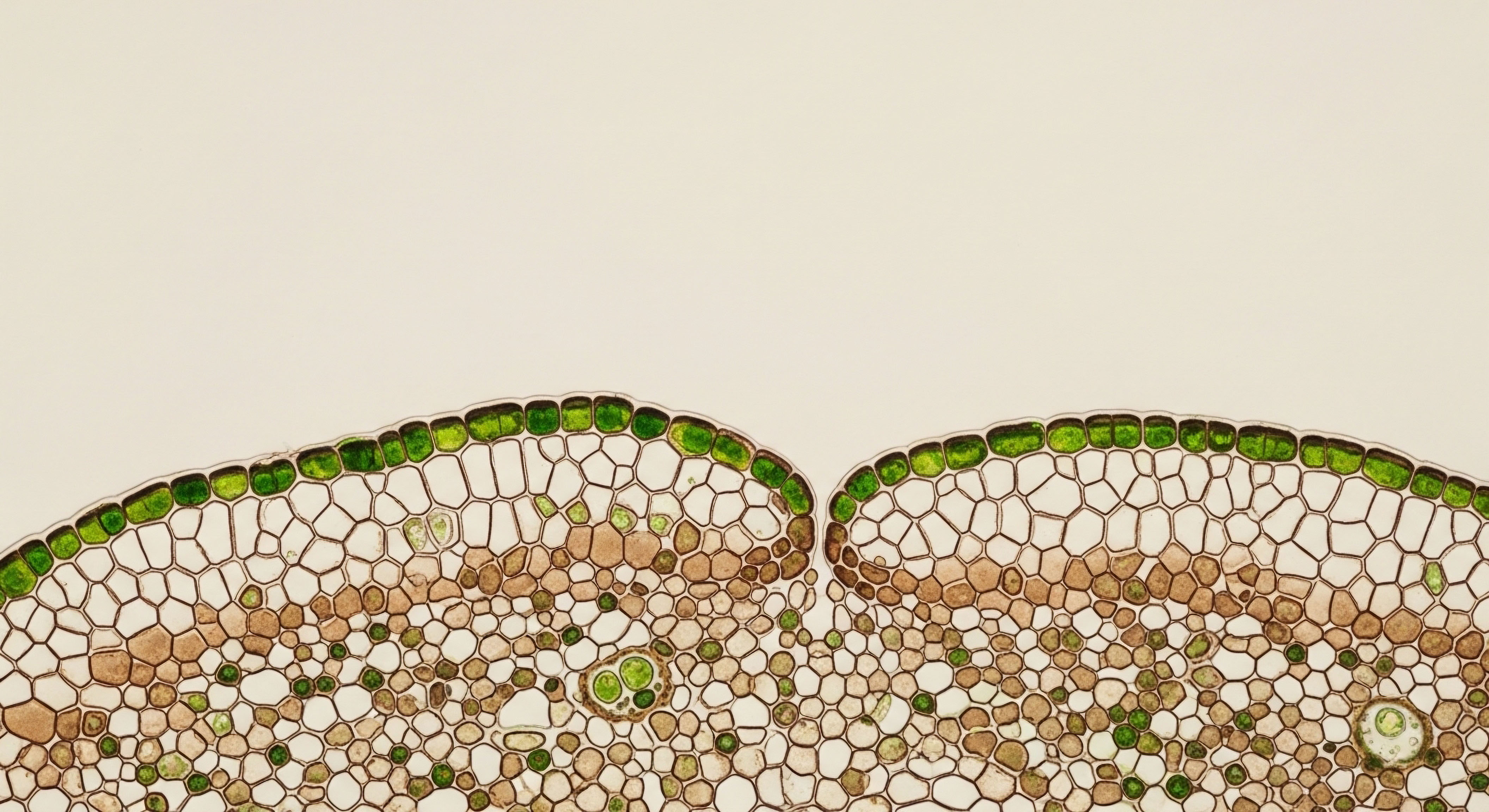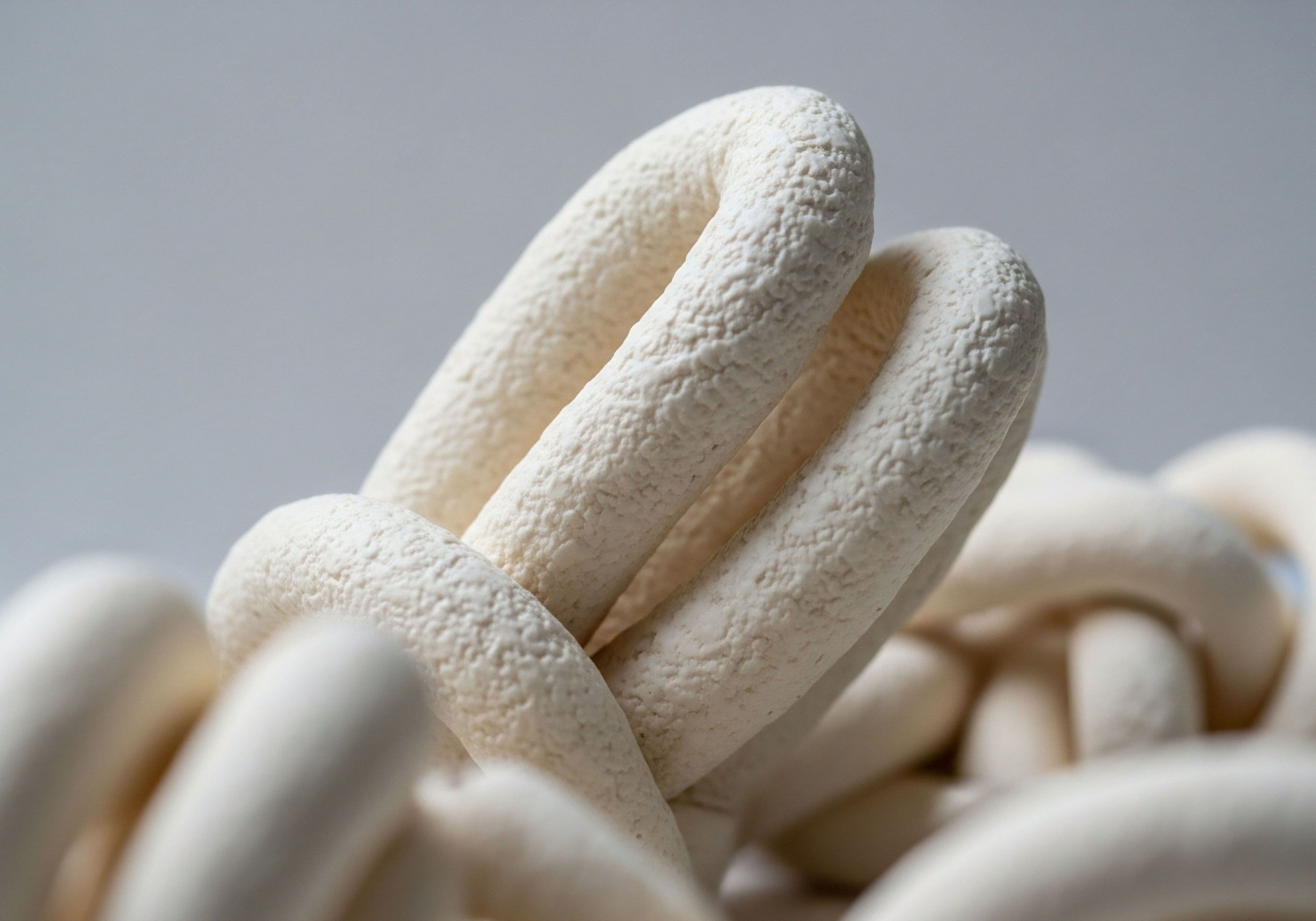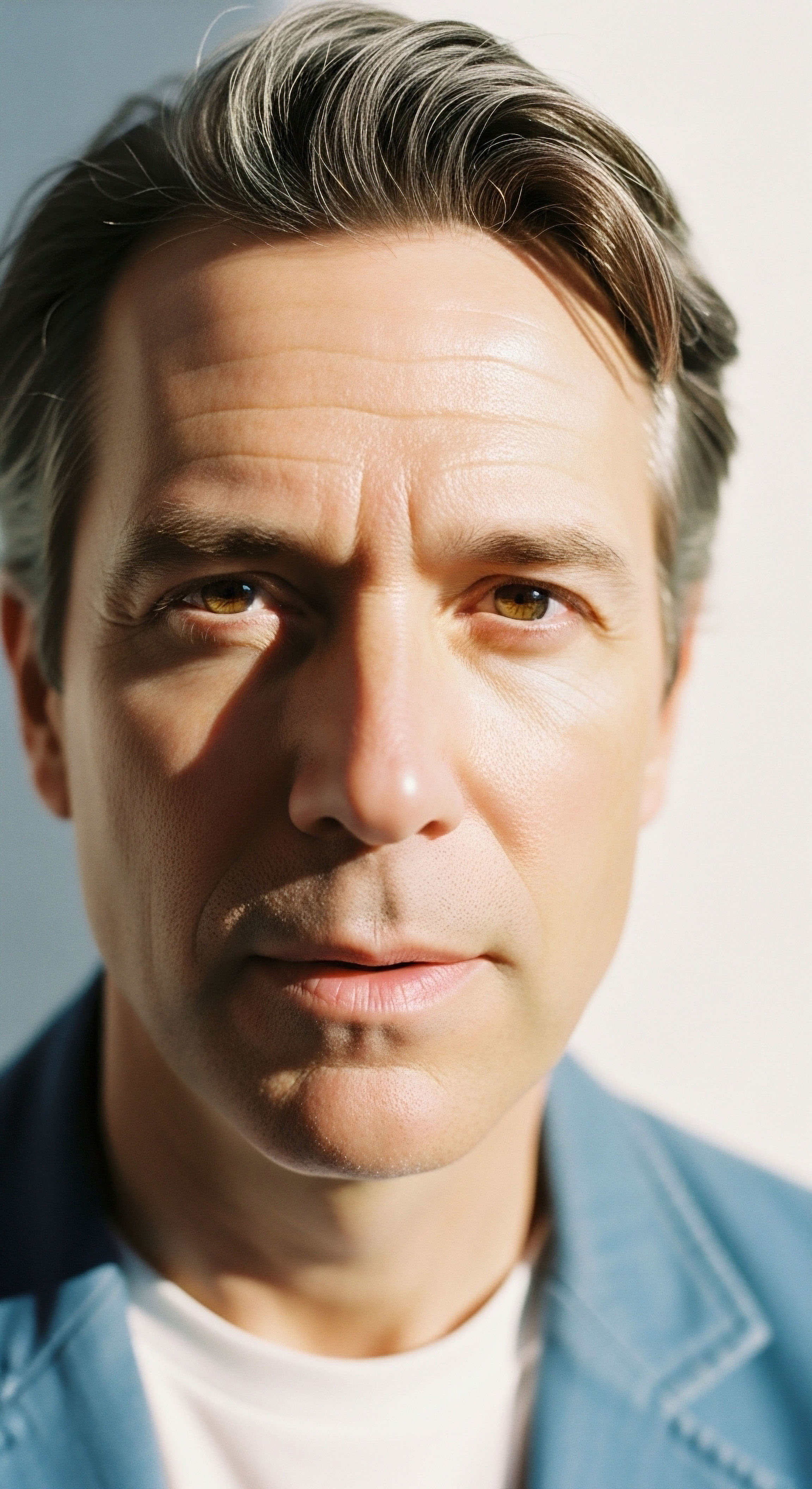

Reclaiming Vitality through Endogenous Pathways
The persistent sensation of waning vigor, a subtle erosion of the energy and clarity once taken for granted, frequently prompts a profound personal inquiry into one’s biological landscape. Many men find themselves confronting a constellation of symptoms ∞ diminished libido, persistent fatigue, an unwelcome expansion of central adiposity, and a pervasive mental fog ∞ that collectively suggest a systemic imbalance.
These experiences are not simply transient inconveniences; they signal a deeper disruption within the intricate biochemical orchestra governing well-being. Acknowledging these lived realities forms the initial step in understanding the profound interplay between our daily choices and our core physiological functions.
Our endocrine system, a sophisticated network of glands and hormones, operates as the body’s primary messaging service, orchestrating virtually every cellular process. Central to male vitality resides the Hypothalamic-Pituitary-Gonadal (HPG) axis, a complex feedback loop regulating testosterone production.
The hypothalamus initiates this cascade by releasing Gonadotropin-Releasing Hormone (GnRH), which then signals the pituitary gland to secrete Luteinizing Hormone (LH) and Follicle-Stimulating Hormone (FSH). These gonadotropins subsequently stimulate the testes to produce testosterone. This elegant system responds dynamically to a multitude of internal and external cues, establishing a delicate equilibrium essential for optimal function.
Understanding the HPG axis illuminates how daily choices profoundly influence the body’s inherent capacity for hormonal equilibrium.
Consider lifestyle modifications as powerful modulators, capable of recalibrating this fundamental axis from its very foundation. These interventions function as upstream signals, communicating directly with the cellular machinery responsible for hormone synthesis and receptor sensitivity. They offer a pathway toward optimizing endogenous testosterone production, often restoring the body’s innate capacity for self-regulation. This approach moves beyond merely addressing symptoms; it targets the fundamental biological mechanisms that govern the genesis of vitality and metabolic resilience.

Understanding Hormonal Homeostasis
Hormonal homeostasis, the body’s steadfast pursuit of biochemical balance, represents a dynamic state rather than a fixed set point. This intricate equilibrium is continuously influenced by environmental stimuli, nutritional inputs, physical activity, and psychological stressors. When these external pressures exceed the system’s adaptive capacity, the HPG axis can become dysregulated, leading to a suboptimal hormonal milieu. The resulting symptoms, though often attributed to aging, frequently represent a cumulative effect of sustained physiological strain.
The concept of a “personal journey” in health means recognizing one’s unique biological blueprint and the specific stressors impacting it. It necessitates a careful, data-informed exploration of how nutrition, movement, rest, and mental state converge to shape hormonal output. This granular understanding allows for the development of highly personalized wellness protocols that resonate with individual physiological needs, aiming to restore systemic harmony and reclaim functional capacity.


Optimizing Endogenous Production Pathways
For men experiencing symptoms indicative of suboptimal testosterone levels, the consideration of Testosterone Replacement Therapy (TRT) often arises as a direct intervention. TRT, typically involving weekly intramuscular injections of Testosterone Cypionate, alongside Gonadorelin and Anastrozole, directly introduces exogenous testosterone into the system. This approach effectively elevates circulating testosterone concentrations, often alleviating symptoms swiftly.
However, a profound understanding of the body’s intrinsic capacity for hormonal regulation reveals the compelling efficacy of targeted lifestyle interventions in recalibrating the HPG axis. These lifestyle strategies operate through distinct biochemical pathways, often fostering a more sustainable and integrated restoration of endocrine function.

How Do Lifestyle Modulations Influence Endocrine Function?
Lifestyle interventions exert their influence across multiple physiological strata, impacting the neuroendocrine signaling, metabolic processes, and cellular responsiveness that collectively dictate hormonal output. Each pillar of wellness ∞ nutrition, physical activity, sleep architecture, and stress management ∞ contributes uniquely to the systemic recalibration of the HPG axis.
- Nutrition ∞ Dietary composition significantly influences insulin sensitivity, systemic inflammation, and the availability of essential micronutrients required for steroidogenesis. A diet rich in whole, unprocessed foods, healthy fats, and adequate protein supports optimal Leydig cell function and reduces inflammatory cascades that can impair testosterone synthesis. Micronutrients such as zinc, magnesium, and vitamin D serve as critical cofactors in the enzymatic processes involved in testosterone production.
- Physical Activity ∞ Regular resistance training and high-intensity interval training (HIIT) stimulate the pulsatile release of Luteinizing Hormone (LH) and enhance Leydig cell sensitivity, thereby promoting endogenous testosterone synthesis. Exercise also improves insulin sensitivity, which indirectly supports testosterone levels by reducing the impact of hyperinsulinemia on sex hormone-binding globulin (SHBG) and aromatase activity.
- Sleep Architecture ∞ The circadian rhythm profoundly influences hormonal secretion patterns. Deep, restorative sleep phases are indispensable for the pulsatile release of GnRH, LH, and subsequent testosterone production. Chronic sleep deprivation disrupts these delicate rhythms, leading to a measurable decline in circulating testosterone levels and a blunted response to LH stimulation.
- Stress Management ∞ Persistent psychological stress triggers the Hypothalamic-Pituitary-Adrenal (HPA) axis, leading to sustained cortisol elevation. Cortisol, a potent glucocorticoid, often exerts an antagonistic effect on the HPG axis, suppressing GnRH and LH release, and directly inhibiting testosterone synthesis within the testes. Effective stress mitigation strategies, such as mindfulness, meditation, and structured relaxation, can attenuate this suppressive effect.
Targeted lifestyle interventions offer a potent strategy for restoring endogenous hormonal balance by influencing the HPG axis at its foundational levels.

Comparing Mechanisms ∞ Lifestyle Recalibration versus Exogenous Therapy
The fundamental distinction between lifestyle-driven endocrine optimization and exogenous TRT lies in their mechanisms of action. TRT provides a direct, supraphysiological influx of testosterone, which often downregulates the body’s intrinsic production via negative feedback on the HPG axis. While effective for symptom management, this approach typically renders the testes quiescent in terms of endogenous production.
Lifestyle interventions, conversely, aim to restore the body’s inherent capacity to produce and regulate its own hormones. They address the upstream signals and cellular environments that influence the HPG axis, fostering a more sustainable and integrated physiological state. This recalibration can enhance receptor sensitivity, optimize enzymatic conversions, and support the overall health of the endocrine glands.
Consider the following comparison of how each approach interacts with the body’s systems:
| Aspect of Endocrine Function | Lifestyle Recalibration | Testosterone Replacement Therapy (TRT) |
|---|---|---|
| Endogenous Production | Enhances and supports natural synthesis. | Suppresses natural synthesis via negative feedback. |
| HPG Axis Activity | Optimizes pulsatile signaling and feedback loops. | Often leads to downregulation or cessation of GnRH/LH/FSH. |
| Metabolic Markers | Improves insulin sensitivity, reduces inflammation. | Directly elevates testosterone, indirect metabolic benefits. |
| Fertility Impact | Generally supportive of spermatogenesis. | Can impair spermatogenesis due to FSH/LH suppression. |
| Systemic Health | Addresses root causes, broad health benefits. | Direct hormonal correction, requires management of side effects. |
The decision between these approaches, or their judicious combination, hinges upon a thorough clinical evaluation, considering the individual’s unique physiological profile, the etiology of their symptoms, and their overarching health objectives.


Epigenetic Modulation and Neuroendocrine Interplay
The assertion that lifestyle changes can surpass the efficacy of exogenous testosterone replacement therapy for specific individuals requires a rigorous examination of the underlying molecular and neuroendocrine mechanisms. This perspective transcends a simplistic comparison of circulating hormone levels, delving into the epigenetic landscape, cellular receptor dynamics, and the intricate cross-talk within the broader endocrine system.
Lifestyle, viewed through this lens, operates as a profound modulator of genetic expression and cellular function, capable of recalibrating the HPG axis at a more fundamental, self-sustaining level than direct hormonal administration alone.

The Epigenetic Orchestra of Hormonal Health
Epigenetics, the study of heritable changes in gene expression that occur without alterations to the underlying DNA sequence, provides a powerful framework for understanding how lifestyle inputs translate into enduring physiological shifts. Dietary patterns, physical activity, sleep quality, and psychological stress directly influence epigenetic modifications such as DNA methylation, histone acetylation, and non-coding RNA expression.
These modifications, in turn, regulate the transcription of genes vital for steroidogenesis, hormone receptor synthesis, and the intricate feedback mechanisms of the HPG axis. For instance, chronic caloric surplus and sedentary behavior can induce epigenetic changes that promote insulin resistance and increase aromatase activity, thereby shunting testosterone toward estrogen conversion. Conversely, targeted exercise regimens and nutrient-dense diets can reverse these unfavorable epigenetic marks, fostering a more robust testosterone-producing environment.
Consider the profound influence of caloric restriction and exercise on sirtuin activity. Sirtuins, a class of NAD+-dependent deacetylases, play a critical role in metabolic regulation, cellular repair, and stress resistance. Their activation through specific lifestyle interventions can enhance mitochondrial function within Leydig cells, optimizing ATP production essential for testosterone synthesis. This intrinsic cellular optimization, mediated by epigenetic and metabolic signaling, represents a deeper, more integrated restoration of function compared to the exogenous provision of the final hormonal product.
Lifestyle inputs orchestrate epigenetic modifications, profoundly influencing gene expression vital for hormonal synthesis and receptor function.

Neuroendocrine Integration and Receptor Sensitivity
The HPG axis does not operate in isolation; it is intricately interwoven with the Hypothalamic-Pituitary-Adrenal (HPA) axis and metabolic signaling pathways. Chronic psychological or physiological stress, leading to sustained glucocorticoid elevation, directly impinges upon GnRH pulsatility in the hypothalamus and LH secretion from the pituitary.
This central suppression, mediated by direct inhibitory effects on neurokinin B/dynorphin/kisspeptin (KNDy) neurons, forms a potent mechanism by which lifestyle-induced stress can compromise testicular function. Effective stress reduction techniques, therefore, contribute to restoring the integrity of this neuroendocrine dialogue, allowing for optimal GnRH and LH signaling.
Furthermore, lifestyle significantly influences androgen receptor (AR) sensitivity. While circulating testosterone levels are important, the functional efficacy of testosterone depends critically on its binding to and activation of its cognate receptors within target tissues.
Factors such as chronic inflammation, nutrient deficiencies, and exposure to endocrine-disrupting chemicals can reduce AR expression or alter its conformational state, diminishing cellular responsiveness even in the presence of adequate hormone levels. Specific dietary components, physical activity, and sleep hygiene can enhance AR expression and sensitivity, ensuring that the available testosterone elicits its full biological effect. This enhancement of cellular responsiveness represents a crucial aspect where lifestyle interventions offer a distinct advantage over simply increasing circulating hormone concentrations.
| Biological Mechanism | Lifestyle Influence | TRT Influence |
|---|---|---|
| DNA Methylation | Modulates gene expression for steroidogenesis. | No direct epigenetic modulation. |
| Histone Acetylation | Regulates chromatin accessibility for hormone-related genes. | No direct epigenetic modulation. |
| Sirtuin Activity | Enhanced by caloric restriction, exercise; optimizes Leydig cell metabolism. | No direct influence on sirtuin pathways. |
| Neurokinin B/Dynorphin/Kisspeptin (KNDy) Neurons | Modulated by stress, sleep, and metabolic signals; influences GnRH pulsatility. | Suppressed by negative feedback of exogenous androgens. |
| Androgen Receptor Expression/Sensitivity | Enhanced by specific nutrients, exercise, reduced inflammation. | Provides ligand, but does not directly enhance receptor function. |

The Interconnectedness of Metabolic and Endocrine Systems
The metabolic state of an individual exerts profound influence over endocrine function. Insulin resistance, a hallmark of metabolic dysfunction, leads to hyperinsulinemia, which can increase sex hormone-binding globulin (SHBG) and elevate aromatase activity, converting testosterone to estrogen.
Lifestyle interventions targeting insulin sensitivity ∞ such as carbohydrate modulation, intermittent fasting, and resistance training ∞ directly address these metabolic derangements, thereby optimizing the testosterone-to-estrogen ratio and increasing free testosterone availability. This comprehensive metabolic recalibration often yields more integrated and enduring improvements in hormonal balance than isolated hormonal interventions.
Moreover, the gut microbiome, often termed the “second brain,” participates in the enterohepatic circulation of estrogens and other steroid metabolites. A dysbiotic gut can lead to altered deconjugation of these hormones, potentially impacting their reabsorption and overall hormonal load. Dietary interventions that support a diverse and healthy gut microbiome indirectly contribute to a more favorable endocrine environment, underscoring the systemic nature of hormonal health.

Can Lifestyle Outperform Exogenous Therapy?
For men with functional hypogonadism ∞ where the HPG axis is intact but suppressed by lifestyle factors ∞ a meticulously designed and consistently executed personalized wellness protocol can indeed lead to a restoration of physiological testosterone levels and a profound improvement in symptoms.
In such scenarios, the sustained recalibration of endogenous pathways often yields benefits that extend beyond mere hormonal numbers, encompassing improved metabolic health, enhanced cognitive function, and a heightened sense of well-being. The sustained engagement with health-promoting behaviors provides a continuous, integrated stimulus for optimal function, potentially offering a more holistic and self-regulated state than that achieved through lifelong exogenous hormone administration.
The critical determinant rests upon a precise differential diagnosis to ascertain the etiology of low testosterone, distinguishing between primary testicular failure and secondary hypogonadism amenable to lifestyle modulation.

References
- Mooradian, Arshag D. John E. Morley, and Sherman G. Korenman. “Biological actions of androgens.” Endocrine Reviews, vol. 8, no. 1, 1987, pp. 1-28.
- Handelsman, David J. and Ronald S. Swerdloff. “Pharmacology of androgens.” Endocrine Reviews, vol. 27, no. 7, 2006, pp. 787-804.
- Traish, Abdulmaged M. and Mohit Khera. “Testosterone and the aging male ∞ a clinical perspective.” Clinical Interventions in Aging, vol. 2, no. 4, 2007, pp. 581-594.
- Vingren, Jill L. et al. “Testosterone physiology in resistance exercise and training ∞ the up-stream regulatory elements.” Sports Medicine, vol. 40, no. 12, 2010, pp. 1037-1052.
- Leproult, Eve, and Plamen D. Penev. “Effect of 1 week of sleep restriction on testosterone levels in young healthy men.” JAMA, vol. 305, no. 21, 2011, pp. 2173-2174.
- Pitteloud, N. et al. “Relationship between testosterone levels and insulin sensitivity in men with type 2 diabetes.” Diabetes Care, vol. 26, no. 5, 2003, pp. 1629-1632.
- Kelly, David M. and T. Hugh Jones. “Testosterone and obesity.” Obesity Reviews, vol. 16, no. 7, 2015, pp. 581-596.
- Ganong, William F. Review of Medical Physiology. 23rd ed. McGraw-Hill Education, 2010.
- Boron, Walter F. and Emile L. Boulpaep. Medical Physiology. 3rd ed. Elsevier, 2017.
- Guyton, Arthur C. and John E. Hall. Textbook of Medical Physiology. 13th ed. Elsevier, 2016.

Reflection on Your Health Trajectory
The intricate dance of hormones within your biological systems offers a profound narrative of your health. Having explored the deep interconnectedness of lifestyle with endocrine function, consider the knowledge gained as a compass for your unique health trajectory. This understanding is a first step, illuminating the pathways through which your daily choices reverberate through your physiology.
Your personal journey toward optimal vitality demands an individualized strategy, one that meticulously considers your specific biological systems and lived experiences. The potential for reclaiming robust function and sustained well-being resides within a thoughtful, evidence-based approach to your own body’s intrinsic wisdom.



